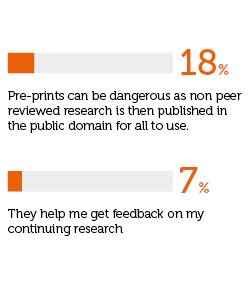In August 2020, we commissioned a global survey to gather views on change within the academic sector. The survey was sent to a random selection of 172,033 academics, librarians and students within Emerald’s literati community. A total of 1,274 literati from 188 countries responded.
The survey report covers attitudes to research impact evaluation, cultural challenges within academia, openness and transparency, and the role publishers can play in furthering change within the research ecosystem.
Use the 'On this page' and 'In the report' menus to quickly see and jump to content you're interested in, or scroll down to see what's here.
- Academic culture
- Impact evaluation
- Openness & transparency in academic research
- The future role of publishers

Openness & transparency
On this page, we take you through the headline findings of our academic culture survey 2020, covering issues such as the pressures within academia and the impact on personal life.
Beyond this, we discuss academic culture in relation to diversity and inclusion, equal opportunities and access to mental health services.
Key themes
Today, researchers can choose from a wide range of open access routes, enjoying the benefits of speedy publication, greater reach and faster impact. Here, we delve into the research community’s positions on issues surrounding open access, data sharing, post-publication peer review and pre-prints.
Academic publishing is evolving, with initiatives such as Plan S fuelling growing demand for open access to research data and publications. The COVID-19 crisis has accelerated this movement, leading many publishers to prioritise the publication of research on coronavirus and eliminate paywalls.
The need for rapid and open publication has also led thousands of coronavirus studies to be posted prior to peer review on pre-print servers such as medRxiv and bioRxiv. Open and immediate access to the latest research on coronavirus is largely seen as essential in the fight against the pandemic, however, some argue that without a lengthy peer-review process pre-prints can be misleading and potentially dangerous.
As the move towards open access hastens, the research community are again questioning the relevance of journal impact factors (JIFs). Many want to see the development of responsible metrics, in addition to other indicators that can fairly assess research quality and individual contribution.
Open access
Amid these ongoing and lively debates, we wanted to gather the research community’s views on open access and open data, as well as gauge how attitudes and behaviours were changing in these areas.
Our survey revealed a significant shift towards publishing through open access and sharing links to supporting datasets as the type of change that researchers are considering – from 29% in 2019 to 51% in 2020.
What, in your opinion, are the challenges to publishing open access?



|
What, in your opinion, are the challenges to publishing open access? |
Net agree (scored 4–5) |
|---|---|
| Limited to access to funding for the cost of open publishing | 74% |
| My institution prefers me to publish in traditional outlets with established metrics such as the impact factor | 48% |
| Resistance of publishers to move away from paywalls | 30% |
| It is not yet widely accepted by all subject disciplines/academic institutions | 30% |
| Policies and funding too STEM-centric compare with social sciences | 17% |
| Not enough publishing platforms allow me to do this at the moment | 17% |
| Confusion over open access mandates like Plan S | 16% |
| I want to publish open access but I’m confused how I go about it | 14% |
| There are no challenges to publishing open access | 6% |
Open data
On the topic of open data, it was unsurprising that half of all respondents (and as many as 61% in North America) were concerned over datasets that contain sensitive or personal information that is inappropriate or unethical to share openly.
For some, there also appears to be a lack of clarity on how to share data, with 7% of respondents admitting that they did not know how to do this. At the regional level, this increases to 16% of respondents in the Middle East and North Africa who were unfamiliar with data sharing.
What, in your opinion, are the challenges to publishing open data?



|
What, in your opinion, are the challenges to publishing open data? |
Net agree (scored 4–5) |
|---|---|
| Some datasets contain sensitive or personal information which is inappropriate or unethical to share openly | 50% |
| Concerns about security of who will re-use the data and how | 46% |
| It is not yet widely accepted yet by all subject disciplines/academic institutions | 37% |
| I am not rewarded for making my data open | 31% |
| Open data will discourage participants from taking part in research projects | 27% |
| Datasets will have to stand-up to external scrutiny | 20% |
| Not enough publishing platforms allow me to do this at the moment | 18% |
| There are no challenges to publishing open data | 8% |
| I don’t know how to share my data | 7% |
Transparency
From a transparency point of view, around 80% of respondents chose the double blind as the most effective peer review method, while post-publication peer review was selected by the fewest respondents.
When considering pre-prints, nearly 1 in 5 said they can be dangerous, a belief held even more firmly with 1 in 4 in Australasia selecting this option. Paradoxically, only 7% of researchers in Northern and Western Europe share the view that they are dangerous. There was some common agreement, however, on the usefulness of pre-prints in getting research out quickly, an option that has gained popularity as the research community comes together to share COVID-19 related data.
Which of the following peer review methods are the most effective, either as an author or as a reviewer?

What is your opinion of pre-prints?




| Which of the following peer review methods are the most effective, either as an author or as a reviewer? | Net agree (scored 4–5) |
|---|---|
| Single blind peer review | 9% |
| Double blind peer review | 82% |
| Open peer review | 16% |
| Post-publication peer review | 9% |
| Transparent peer review | 21% |
| What is your opinion of pre-prints? | Net agree (scored 4–5) |
|---|---|
| Pre-prints can be dangerous as non-peer reviewed research is then published in the public domain for all to use | 18% |
| Pre-prints add to the noise of research and aren’t helpful | 12% |
| There needs to be some quality assessment | 19% |
| Pre-prints are useful to get research out quickly | 23% |
| They help me get feedback on my continuing research | 7% |
| They are not needed in the Humanities/Social Sciences | 2% |
| I am not familiar with pre-prints | 17% |
Your words & comments
“The fact that reviewers are not paid for their assistance, but authors are required to pay.”
Female, Australasia, Researcher
“If I have invested significantly in collecting and cleaning data, I have real issues with providing it for free. That dilutes my investment.”
Male, NA, Teaching
“Authors have strong incentives to keep their own data private and almost no incentives to share.”
Male, NA, Head of Department
“Open access fees are quite high (even if justified). Too much effort has to be invested in ‘fundraising’. On the other hand, there are many predator journals which publish anything against payments, thus a negative halo effect associated with open publications can be observed.”
The Emerald view
Reflecting on the findings, Shelley Allen Head of Open Research at Emerald, highlights the challenges to open access and data sharing, along with her thoughts on peer-review practices and the rise of pre-prints.
![]()
As the survey suggests, we are seeing a growing trend towards open access publishing. However, there are two significant challenges – lack of funding and confusion over data sharing. A lot of our researchers aren’t funded or in receipt of large grants that would cover an Article Processing Charge (APC). Therefore, we developed a zero-embargo green policy, so that they can make their Author Accepted Manuscript (AAM) available. We’re also in discussion with libraries and consortia to find mechanisms to transition subscription spend to support open access. This includes transformative agreements where possible.
In terms of sharing data, this is an area where we see a lot of confusion for our authors. As most aren’t funded, the first time they will make their data available is with us, at the stage of publication. There are challenges in identifying it, anonymising it, finding a suitable repository and there are still huge cultural barriers as there isn’t yet much incentive for them to share their data.
Supporting open data sharing
In our experience of supporting authors, we see a lack of incentive, infrastructure and education on open data. As part of the research ecosystem, there’s a lot publishers can do to help. Guidance and support are key to help authors understand what counts as a data set (it isn’t always clear in social science), how to anonymise it and where to place it so that it is available in the future and has a digital object identifier (DOI).
We mandate open data on our open research platform – Emerald Open Research. We work closely with our authors to support them and we are learning a lot alongside them about what works and what doesn’t. We’re working towards mandating data availability statements across our titles to help build understanding and actively encourage authors to consider sharing their data. We want to make sure our systems can fully support them before we do this though, such as providing appropriate templates to guide them.
Do we still need peer review?
There are pros and cons to all forms of peer review, and none are the perfect system, but I do think some form of quality validation is important in a world of fake news, etc. For me, it’s about author choice and what best suits the research. For some, speed is of the essence, or they have concerns about bias and want an author led approach. Post publication peer review like we have on Emerald Open Research is a good option for them. Others are more comfortable having their work validated and improved before it is available for all to read.
The challenge of finding reviewers is the biggest stumbling block in all approaches. They are a scarce resource, so I think support and incentives for reviewers is where I would start with all review systems, regardless of structure.
A role for pre-prints?
There are concerns about pre-prints, as it can be an impossible task to kill bad information once it is out there, but there is no doubt they are here to stay and can be very useful for getting research out there quickly. There isn’t the same tradition of pre-prints in the social sciences, but they clearly have a role to play in the process of research dissemination. For me, the challenge is ensuring that validation happens quickly, or we find ways to inform the media and the public more clearly about what a preprint is.


